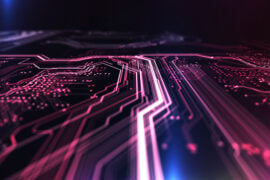In Brief
Recent developments in AI technologies have led to the increased use of AI to create a range of works, such as art, music, stories, and even lines of software code, in response to human inputs. This has resulted in an uptick of copyright applications filed with the U.S. Copyright Office (the “Office”) seeking registrations for works with varying degrees of contributions from generative AI tools. This calls into question whether, and to what extent, works authored with AI are entitled to U.S. copyright protection. Longstanding copyright policy limits copyright protection to original works of authorship—where “authorship” is limited to works created by human authors.
In response to the recent AI trend, on March 15, 2023, the Office issued a “Statement of Policy” regarding its position on how to examine and register works created with the assistance of AI. The key takeaway is that works created, in part, with AI technologies may nevertheless be registrable and enjoy copyright protection for the “material that is the product of human creativity.” Importantly, the Copyright Office will analyze applications for works created with the assistance of AI on a “case-by-case” basis and will only register works containing human contributions that meet the threshold requirements for originality and human authorship.
Background
In the third edition of its Compendium, the Office stated without qualification that it “will refuse to register a claim if it determines that a human being did not create the work.” U.S. COPYRIGHT OFFICE, COMPENDIUM OF U.S. COPYRIGHT OFFICE PRACTICES § 306 (3d ed. 2021). If a work is produced with a computer, the question is “whether the ‘work’ is basically one of human authorship, with the computer [or other device] merely being an assisting instrument, or whether the traditional elements of authorship in the work (literary, artistic, or musical expression or elements of selection, arrangement, etc.) were actually conceived and executed not by man but by a machine.” Id. at § 313.2 (quoting U.S. COPYRIGHT OFFICE, REPORT TO THE LIBRARIAN OF CONGRESS BY THE REGISTER OF COPYRIGHTS 5 (1966)).
On this background, the Office recently cancelled a portion of the copyright registration for images in a comic book titled Zarya of the Dawn that was created in part with AI technology. The technology, called Midjourney, was used to generate the images for the comic book. The Office had to resolve which portions of the book were and were not copyrightable in light of the AI’s role in creating the work. The Office decided that the text and arrangement of the text and images were copyrightable as they were created by a human. However, the images were not created by a human and were excluded from protection. The Office reasoned that the AI, and not a human, was the “master mind” behind the images. The Office explained that the AI system ultimately controlled how the Zarya images were generated, despite the fact that a human provided instructions and prompts to the AI for creating those images. The Office is also currently engaged in litigation challenging its refusal to register a copyright to AI activist Stephen Thaler for an artwork that Thaler states was created “autonomously” by an AI called the “Creativity Machine.”
Summary of Copyright Office’s Statement
Following the Zarya decision, the Office issued a general Statement of Policy on AI-generated works. The Statement aims to clarify the ambiguity surrounding works authored in whole or in part with AI systems. The Statement reinforces the fundamental principle that works must be “the product of human authorship.” However, the Statement notes that the Office will treat each situation involving AI on a case-by-case basis and look to whether the AI-generated content results from “mechanical reproduction” versus a (human) author’s “own mental conception.” Importantly, the Statement clarifies that, if a human merely provides an AI system with prompts—and the AI system follows these prompts—that the AI output content will not merit copyright protection. This is consistent with the Office’s decision in the Zarya case. Additionally, the Statement provides that applicants for copyright must “disclose the inclusion of AI-generated content in a work submitted for registration.” As always, applicants must certify in an application that the statements made therein are correct to the best of the applicant’s knowledge. For applications already submitted, the Statement urges applicants to check the information provided to the Office and make necessary corrections.
Best Practices
We can expect that the Office will continue to receive an influx of applications for works created with the assistance of generative AI and that further challenges to the scope of protection afforded to such works will continue to make their way through the courts. Nonetheless, copyright owners can take steps to ensure that their works are defensible in the eyes of the Office and courts. For example, in light of the requirement that applicants identify the elements of a work that were authored by a human (directly or using AI as a mere tool), authors are encouraged to keep reasonably detailed documentation substantiating any human-made contributions separate and apart from the AI contributions. In addition, applicants should disclose and exclude from protection any AI-contributions. A failure to do so may result in the rejection of an application or the invalidation of the copyright altogether. We will continue to stay abreast of these developments to keep our clients informed of the latest guidance and regulations, including with respect to working within this evolving legal landscape and managing IP development and protection across multiple jurisdictions.



